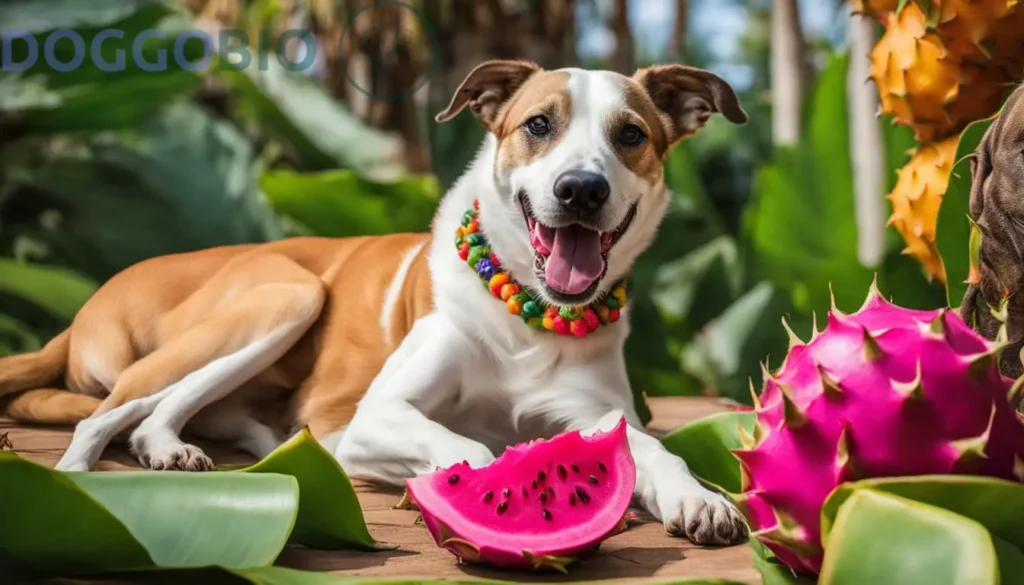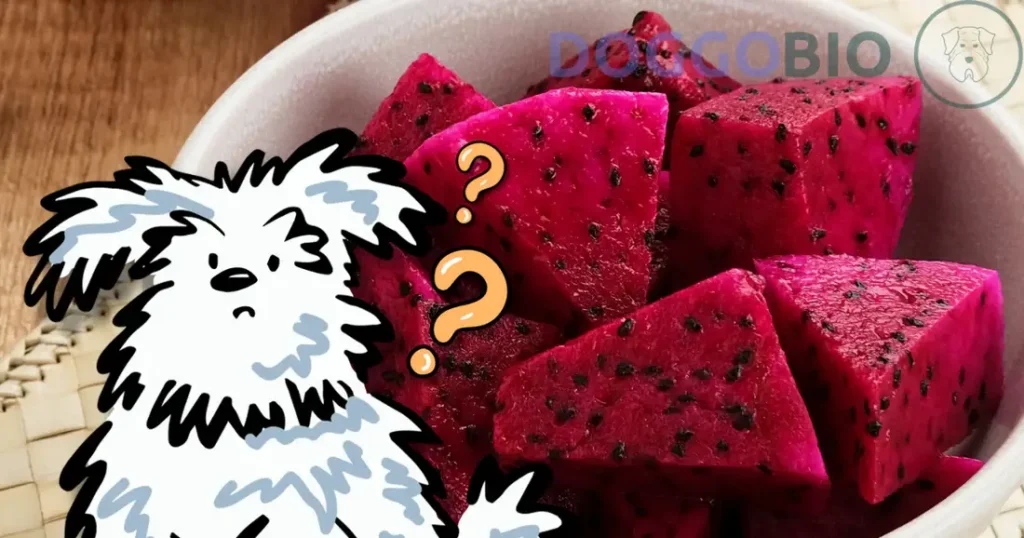As pet owners, we commonly seek ways to ensure our furry friends are healthy and happy. This quest often leads us to explore foods that could add nutritional value to their diets. One such intriguing option is dragon fruit, a vibrant and exotic fruit known for its unique appearance and health benefits for humans.
But the common question arises: Can Dogs Eat Dragon Fruit? The answer is yes, dogs can eat dragon fruit.
This article delves into the specifics of feeding dogs dragon fruit, exploring the benefits and considerations to keep in mind to ensure your canine companion enjoys this fruit safely.
Can Dogs Eat Dragon Fruit?
Yes, dogs can eat dragon fruit. Dragon fruit is nutritious for dogs, offering benefits like magnesium for bone health, fiber for digestion, and hydration due to its high water content. It’s also low in calories and contains beneficial vitamins and fatty acids.

However, the skin should be removed before feeding it to dogs, as it can be a choking hazard. The seeds are safe. Introduce dragon fruit gradually to your dog’s diet to monitor for any adverse reactions. While generally safe, it should be given in moderation due to its sugar and fiber content, which can cause digestive issues if overconsumed. Always consult a veterinarian before introducing new foods to your dog’s diet.
Benefits of Dragon Fruit for Dogs
- Promotes Digestive Health: The high fiber content in dragon fruit can help regulate digestion in dogs, preventing constipation and promoting healthy bowel movements.
- Boosts Immune System: The vitamin C in dragon fruit can help boost a dog’s immune system, protecting them from illnesses and infections.
- Supports Healthy Skin and Coat: The B vitamins in dragon fruit can help maintain a dog’s skin and coat health, keeping their fur shiny and soft.
Risks of Feeding Dragon Fruit to Dogs
While dragon fruit does offer some nutritional benefits for dogs, there are also some risks associated with feeding it to them. Here are some things to keep in mind before giving your dog dragon fruit:
- High Sugar Content: Dragon fruit is high in natural sugars, which can cause digestive upset and weight gain in dogs if consumed in large quantities.
- Potential Allergies: As with any new food, there is a risk of your dog being allergic to dragon fruit. If you notice any signs of an allergic reaction, such as vomiting or diarrhea, discontinue feeding it to your dog and consult with your veterinarian.
- Choking Hazard: The tiny seeds in dragon fruit can pose a choking hazard for dogs, which are significantly smaller breeds. It is essential to remove the seeds before giving dragon fruit to your dog.
How do you safely feed dragon fruit to your dog?
If you have decided to give your dog dragon fruit, here are some tips on how to do so safely:

1.Preparation
Before feeding your dog dragon fruit, wash it thoroughly and remove the skin and seeds. The skin is not toxic to dogs but may be difficult to digest.
Additionally, the seeds can pose a choking hazard, so removing them before giving the fruit to your dog is best.
2.Portion Control
Dragon fruit should only be given to dogs in moderation. Too much of this fruit can cause digestive upset and weight gain due to its high sugar content. Generally, treats should not make up more than 10% of a dog’s daily calorie intake.
3.Introduce Slowly
If your dog has never had dragon fruit before, it is important to introduce it slowly into their diet. Start with a small amount and monitor their reaction before gradually increasing the portion size.
Can Puppies Eat Dragon Fruit?
No, puppies have different nutritional needs than adult dogs; therefore, feeding them dragon fruit is not recommended.
Puppies require a balanced diet specifically formulated for their growth and development, and dragon fruit does not provide all the necessary nutrients they need.
Additionally, puppies, as well as adult dogs, have more sensitive stomachs and may not be able to tolerate new foods.

When Can Puppies Eat Dragon Fruit?
Puppies can start eating small amounts of dragon fruit once they reach adulthood, typically around 1 year of age for most breeds.
However, it is always best to consult your veterinarian before introducing new foods into your puppy’s diet.
Frequently Asked Questions
Can dogs eat dragon fruit skin?
No, while the skin of dragon fruit is not toxic to dogs, it may be difficult for them to digest and could cause digestive upset. It is best to remove the skin before feeding dragon fruit to your dog.
Can dogs eat dragon fruit seeds?
No. The seeds in dragon fruit can pose a choking hazard for dogs, significantly smaller breeds. Removing the seeds before giving this fruit to your dog is essential.
Can diabetic dogs eat dragon fruit?
No, due to its high sugar content, dragon fruit is not recommended for diabetic dogs. Consult with your veterinarian for suitable low-sugar treats for your diabetic dog.
Can dogs eat frozen dragon fruit?
Yes, Frozen dragon fruit is safe for dogs to eat, but it is important to thaw it before giving it to them. Frozen fruit can be too hard for dogs to chew and may cause tooth damage.
Can dogs eat dried dragon fruit?
No, dried dragon fruit is not recommended for dogs as it contains higher sugar levels and added preservatives that can harm dogs.
Conclusion
In conclusion, while dragon fruit can be a nutritious and tasty treat for humans, it’s essential to consider whether it’s safe for our canine companions.
After examining the potential benefits and risks associated with dogs consuming dragon fruit, it’s evident that moderation and caution should be exercised. While small amounts of ripe, peeled dragon fruit may be safe for some dogs, there is a risk of gastrointestinal upset due to its high fiber content and the presence of seeds. Additionally, dogs with sensitive stomachs or those prone to allergies should avoid it altogether.
As responsible pet owners, it’s crucial to prioritize our furry friends’ health and well-being by consulting with a veterinarian before introducing any new foods into their diets. Ultimately, the question “Can dogs eat dragon fruit?” highlights the importance of informed decision-making and ensuring that our pets’ nutritional needs are met safely.
\